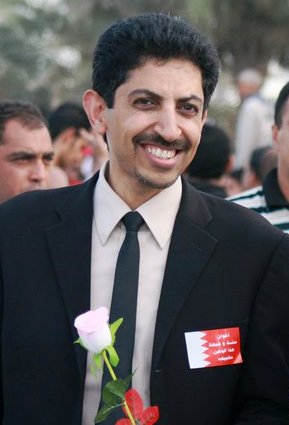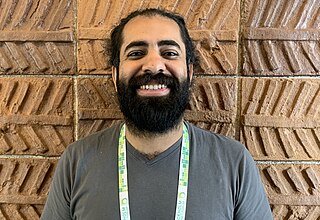
The Bahrain Centre for Human Rights was a Bahraini non-profit non-governmental organisation which works to promote human rights in Bahrain, which was founded by a number of Bahraini activists in June 2002. The centre was given a dissolution order after its former president Abdulhadi Al Khawaja was arrested in September 2004 a day after criticizing the country's Prime Minister, Khalifah ibn Sulman Al Khalifah at a seminar in which he blamed the Prime Minister for the failure of widespread economic development for all citizens. The BCHR is still banned by the government, but has remained very active.
Colonel Adel Jassim Flaifel is a former colonel in the State Security and Intelligence Service of Bahrain. He is accused of committing, or overseeing, acts of physical and psychological torture on Bahraini citizens from 1980s until 1997. He was released from his duties in December 2002 due to protests and pressures from human rights organizations worldwide. In March 2000, King Hamad awarded Flaifel with the Order of Shaikh Isa bin Salman Al Khalifa.

Bahrain's record on human rights has been described by Human Rights Watch as "dismal", and having "deteriorated sharply in the latter half of 2010". Their subsequent report in 2020 noted that the human rights situation in the country had not improved.

Mansoor al-Jamri is a Bahraini columnist, author, human rights activist and former opposition leader. He is the editor-in-chief of Al-Wasat, an Arabic language independent daily newspaper. He is also the second son of the Shia spiritual leader Sheikh Abdul-Amir al-Jamri, who died in 2006.

Abdulhadi Abdulla Hubail al-Khawaja is a Bahraini political activist. On 22 June 2011, al-Khawaja and eight others were sentenced to life imprisonment following the suppression of pro-democracy protests against the Bahraini government. al-Khawaja has previously gone on a series of hunger strikes while serving his life sentence, in protest of the political conditions in Bahrain.

The 2011Bahraini uprising was a series of anti-government protests in Bahrain led by the Shia-dominant and some Sunni minority Bahraini opposition from 2011 until 2014. The protests were inspired by the unrest of the 2011 Arab Spring and protests in Tunisia and Egypt and escalated to daily clashes after the Bahraini government repressed the revolt with the support of the Gulf Cooperation Council and Peninsula Shield Force. The Bahraini protests were a series of demonstrations, amounting to a sustained campaign of non-violent civil disobedience and some violent resistance in the Persian Gulf country of Bahrain. As part of the revolutionary wave of protests in the Middle East and North Africa following the self-immolation of Mohamed Bouazizi in Tunisia, the Bahraini protests were initially aimed at achieving greater political freedom and equality for the 70% Shia population.

Nabeel Ahmed Abdulrasool Rajab is a Bahraini human rights activist and opposition leader. He is a member of the Advisory Committee of Human Rights Watch's Middle East Division, Deputy Secretary General for the International Federation for Human Rights (FIDH), former chairman of CARAM Asia, member of the Advisory Board of the Bahrain Rehabilitation and Anti-Violence Organization (BRAVO), and Founding Director of the Gulf Centre for Human Rights (GCHR).
The international reactions to the 2011 Bahraini uprising include responses by supranational organisations, non-governmental organisations, media organisations, and both the governments and civil populaces, like of fellow sovereign states to the protests and uprising in Bahrain during the Arab Spring. The small island nation's territorial position in the Persian Gulf not only makes it a key contending regional power but also determines its geostrategic position as a buffer between the Arab World and Iran. Hence, the geostrategic implications aid in explaining international responses to the uprising in Bahrain. Accordingly, as a proxy state between Saudi Arabia and Iran, Bahrain's domestic politics is both wittingly and unavoidably shaped by regional forces and variables that determine the country's response to internal and external pressures.
Naji Ali Hassan Fateel is a Bahraini human rights activist and member of the Board of Directors of the Bahraini human rights NGO Bahrain Youth Society for Human Rights (BYSHR). Since 2007 he has been imprisoned, tortured and the target of death threats during the Bahraini uprising (2011–present). He has been the subject of urgent appeals by international human rights organisations and the United nations special Rapporteur on Human Rights Defenders.
The Human Price of Freedom and Justice is a joint report by a group of Bahrain's independent human rights NGOs presenting the main key findings from the ongoing effort to document violations occurring in the state of Bahrain during the Bahraini uprising (2011–present). The 87-page report gives background to the situation, then identifies and document all the types of violations that took place, with the aim of putting out recommendations to the Bahraini government, as well as the EU, US, UN OHCHR and the ICC. The report was published on 22 November 2011, 1 day before the Bahrain Independent Commission of Inquiry report was published. The report has found that the violations have been widespread and systematic. Finally, the report urged the U.N. to "send an urgent mission to Bahrain to investigate the deaths of at least 4 protesters killed since BICI closed its doors."

Zainab Abdulhadi al-Khawaja is a Bahraini human rights activist, and a participant in the Bahraini uprising. She rose to prominence after posting tweets online about the protests under the name AngryArabiya as well as for protesting her father Abdulhadi Alkhawaja's detention during his hunger strike.

Mohammed Issa al-Tajer is a Bahraini human rights lawyer detained in April 2011, apparently for his role in defending Arab Spring protesters.

Abduljalil Abdulla al-Singace is a Bahraini engineer, blogger, and human rights activist. He was arrested in 2009 and 2010 for his human rights activities and released later. In 2011, he was arrested, allegedly tortured and sexually abused, and sentenced to life imprisonment for pro-democracy activism during the Bahraini uprising.

Mohammed Abdulnabi al-Maskati is a Bahraini human rights activist and digital security consultant for Middle East and North Africa. He is the founder of the Bahrain Youth Society for Human Rights (BYSHR), a leading group in the 2011-2012 Bahraini uprising.

Yousef al-Mahafdha is a member of the Bahrain Centre for Human Rights and the organization's acting vice president.
The following is an incomplete timeline of events that followed the Bahraini uprising of 2011 from January to August 2012. This phase saw the first anniversary protest of the Bahraini uprising, the largest demonstrations in the history, and the escalation of violent clashes between youths and security forces.

The Day of Rage is the name given by protesters in Bahrain to 14 February 2011, the first day of the national uprising as part of the Arab Spring. Inspired by successful uprisings in Egypt and in Tunisia, Bahraini youth organised protests using social-media websites. They appealed to the Bahraini people "to take to the streets on Monday 14 February in a peaceful and orderly manner". The day had a symbolic value, being the ninth and tenth anniversaries of the country's 2002 constitution and the National Action Charter respectively.

The Bahrain Thirteen are thirteen Bahraini opposition leaders, rights activists, bloggers and Shia clerics arrested between 17 March and 9 April 2011 in connection with their role in the national uprising. In June 2011, they were tried by a special military court, the National Safety Court, and convicted of "setting up terror groups to topple the royal regime and change the constitution"; they received sentences ranging from two years to life in prison. A military appeal court upheld the sentences in September. The trial was "one of the most prominent" before the National Safety Court. A retrial in a civilian court was held in April 2012 but the accused were not released from prison. The sentences were upheld again on 4 September 2012. On 7 January 2013, the defendants lost their last chance of appeal when the Court of Cassation, Bahrain's top court upheld the sentences.
The following is an incomplete timeline of events that followed the Bahraini uprising of 2011 from September 2012 onward.
Bahrain Tamarod, also known as August 14 Rebellion, was a three-day protest campaign in Bahrain that began on 14 August 2013, the forty-second anniversary of Bahrain Independence Day and the two-and-a-half-year anniversary of the Bahraini uprising. The call for protests had started in early July following and inspired by the Egyptian Tamarod Movement that led to the removal of President Mohamed Morsi. Calling for a "free and democratic Bahrain", Tamarod activists, who mobilized social networking websites, said their movement was peaceful, national and non-sectarian. They called for gradual peaceful civil disobedience starting from 14 August. The movement gained the support of opposition societies and human rights activists, including those languishing in prison. The government however, repeatedly warned against the protests, promising those who participate with legal action and forceful confrontation. Rights activists and media reported that authorities had stepped up their crackdown campaigns in the weeks leading to the protests.












